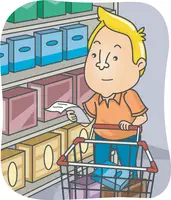

Lesson 20 - Comida (Food)
Navigation: Home
→ Course
→ Lesson 20
→ Dialogue
Pages in this lesson: Food - mucho/poco - Dialogue - Reading - Quiz
This page: Practice with food vocabulary with this dialogue of a couple making their grocery list.

El Supermercado
(The Grocery Store)
Dialogue Lesson
Key Vocabulary
The following is a list of key vocabulary that you will need to know to understand the lesson. Click on the word to hear the pronunciation.
- ► haciendo = making, doing
- ► ni = nor*
*The word ni is generally used in pairs.
- ni...ni = neither...nor
- No tenemos ni leche ni huevos. = We don't have milk or eggs.
The above sentence literally means, "We don't have neither milk nor eggs." It sounds very ungrammatical in English, but this is how it would be said in Spanish. Double negatives are commonly used in Spanish.
Dialogue
Now read the dialogue.
- HOMBRE - Estoy haciendo la lista de compras. ¿Tenemos leche?
- MUJER - No, no tenemos ni leche ni huevos.
- HOMBRE - ¿Tenemos pan?
- MUJER - Sí, tenemos mucho pan, pero tenemos poca pasta. Necesitamos más. Quiero hacer pasta mañana para la cena.
- HOMBRE - Está bien. ¿Tenemos salsa para la pasta?
- MUJER - Tenemos un poco. Tienes que comprar más.
- HOMBRE - Está bien. ¿Hay algo más?
- MUJER - También quiero hacer una ensalada. Necesitamos lechuga y tomates.
- HOMBRE - Está bien. Tenemos muchas zanahorias en el refrigerador. Podemos poner zanahorias en la ensalada. Creo que tengo todo en la lista. Voy al supermercado. Adiós.
Practice
Write sentences about what they have and don't have. Use the words mucho or poco in their correct form when possible. Don't forget to use correct capitalization, accents and punctuation, or the computer will mark it as incorrect.
- Tienen mucho/poco _____. (They have a lot/little _____.)
- No tienen _____. (They don't have _____.)
Dictation
Dictations are great for practicing listening and spelling in Spanish. Click on "Listen" to hear the dictation of a sentence. The sentence will be read once quickly and then repeated slowly with pauses to write the words. Write the sentence in the textbox. Click on "Check" to check your answer. Don't forget to use correct capitalization, accents and punctuation, or the computer will mark it as incorrect.
Writing
What is on your grocery list? What do you need to buy?
- Necesito _____. (I need _____.)
If you want to type a special character (like an accented letter) in the comments section, you could do one of the following . . .
- Select and copy the character that you need → á é í ó ú ü ñ ¿ ¡ Á É Í Ó Ú Ü Ñ « »
- Use special codes on your computer if you have numeric keypad (instructions HERE).
- Type your sentences into the text box below and use the special character buttons provided. Then select and copy your text and paste it into the comments section.
If you see an error in someone else's sentence, please respond with the correction. Comments that are not from "Janet Castrejon" (the author of this page) do not represent Simplified Spanish. If someone is writing inappropriate comments on this webpage, please send a message to [email protected] and include the page that you saw the comment on.
Lesson 20 - Comida (Food)
Food - mucho/poco - Dialogue - Reading - Quiz
Important Links
Pronouns - Pronunciation - Verbs


